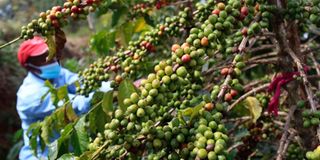Premium
Kenyan coffee farmers miss 2021 global boom

A farmer tends to his coffee bushes in Nyeri on November 9, 2021. Coffee production rose last year due to favourable weather.
What you need to know:
- Operational efficiencies have denied Kenyan coffee farmers better prices.
- The price of the coffee was volatile through the year but averaged Sh33,147 per 50 kilogrammes bag.
In November last year, coffee prices reached new multi-year highs, as the monthly average of the International Coffee Exchange (ICO) composite indicator price was 195.17 US cents/lb, an increase of 68 per cent as compared to 115.7 US cents/lb in January.
These price levels during coffee year 2021/22 marked a significant and steady recovery from the low levels experienced over the four preceding coffee years.
The surge was driven by a global rise in commodity prices and supply chain disruptions after Brazil, the world’s largest producer, was hit by frost.
Brazil produces up to 60 million kilogrammes of coffee every year, but the harsh weather conditions would see the country lose about 20 per cent of the entire crop creating a shortage in the global market. The weather phenomenon in Brazil has seen the price of Arabica coffee surge to the highest level in almost seven years.
But the jury is still out there on whether Kenyan farmers have reaped from the misfortune of their counterparts.
Good prices
The price of the coffee was volatile through the year but averaged $300 (Sh33,147) per 50 kilogrammes bag.
Nairobi Coffee Exchange (NCE) chief executive Daniel Mbithi said Kenya enjoyed good prices occasioned by an increase in the world market decline of coffee from Brazil.
Head of Coffee Directorate Enosh Akuma noted that prices have surged, but farmers are getting varied prices depending on the region and factories that process their crop. “We are receiving the best prices compared to other mild growers like Costa Rica, Ethiopia and Columbia,” Eng Akuma said.
“We have had areas in Kirinyaga where some have even gotten $1 (Sh113) a kilo which is the highest in 10 years,” he said.
He observed that some farmers have not benefitted from the price increase because of operational inefficiencies of production. He said many farmers’ cooperatives are offering smaller produce of about 100 kilos yet one requires almost 700,000 kilos to make economic sense.
Declining quality
The small factories suffer because they meet higher costs paying the general manager, secretary, board, transport and electricity costs yet their revenues are limited.
NCE has also blamed declining quality of the beans from some farmers, who have missed out on the boom.
The auction has been registering a marginal decline in value in the last couple of sales with NCE blaming it on a drop in premium grade, which normally plays a crucial role in lifting the total earnings.
NCE said the decline was negligible and that the prices were still impressive for the last couple of sale when it recorded a drop but traded above $300 at this time of the year, which is normally characterised with low earnings.
“We expect the high returns to continue this year then drop in 2023 because it usually takes about a year for a crop to recover from frost,” he said.





